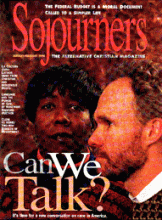It was Holy Thursday. It seemed the appropriate question: "Professor Crossan, the Jesus Seminar just announced its conclusions on the resurrection. The seminar, of which you are a member, has concluded that Jesus didn't really rise from the dead. What's up with that?" Or words to that effect. I went to hear John Dominic Crossan, professor at DePaul
University and the author of many books on the historical Jesus, including Who Killed Jesus? Exposing the Roots of Anti-Semitism in the Gospel Story of the Death of Jesus, with all the conservative evangelical skepticism I could muster. To me, Crossan and the Jesus Seminar, a group of scholars whose controversial pronouncements on the historical realities of Jesus have angered many, are the pariahs of biblical scholarship.
Crossan smiled. He's a slight man with an Irish lilt to his voice. His manner, like I imagine his oft-cited St. Patrick's, could charm serpents to the sea. "For me, it could go either direction," he said. "Whether he rose physically from the grave is not central. The effect was that people, after the resurrection, were now associating Jesus with their connection to God. He was providing them a way to get in touch with the spiritual. Whether he was in the body or not, the disciples were experiencing Jesus in a radically different way-regardless of distance, time, or physical obstacle. I mean, he was coming through locked doors."
Provocative words. The seminar has sought to dismantle systematically many of the core beliefs of Christianity (see "The Jesus Seminar," below). Yet while affirming his view that the resurrection was not historical fact, Crossan did acknowledge that something historically valid happened after the crucifixion that was real and powerful.
This surprised me. As an evangelical, I challenge any pseudo-gnostic ideas of Jesus. The seminar often appears arrogant in its treatment of the foundations of Christian belief. Yet after an hour of listening
Read the Full Article
